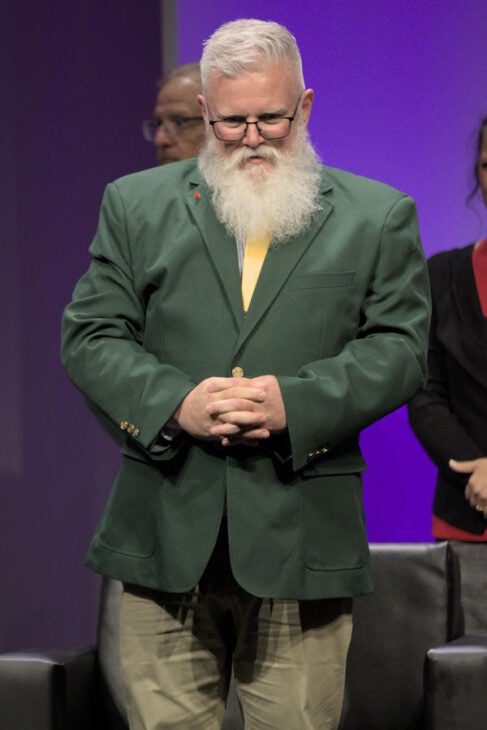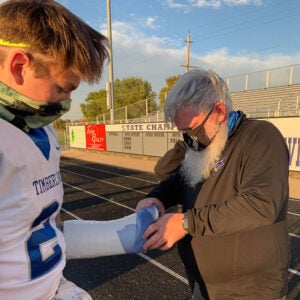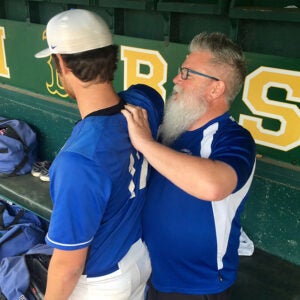
Tony “Fitz” Fitzpatrick thought he’d probably be in Seattle.
Instead, the Boise State graduate, generous donor and national hall of fame designee stayed put — and in doing so, has helped to chart a course toward the future for thousands of physicians, nurses and other professionals.
Fitzpatrick, nearly universally known as Fitz, retired in May following a 35-year career with the Boise School District, first at Boise High School and then helping to open Timberline High School. Already an inductee of the Idaho Athletic Trainers Hall of Fame, in June he flew to Indianapolis for the annual meeting of the National Athletic Trainers’ Association and to be inducted into the association’s hall of fame. Did we mention that he is a Boise State Distinguished Alumni Award winner?
And all the honors, it seems, have paled compared with the joy of empowering students.
Finding athletic training… and home
The Montana native earned a first bachelor’s degree at what was then the College of Great Falls, now known as the University of Providence. On the advice of mentors, and because he could not be nationally credentialed in the then-fledgling field of athletic training with the degree he had, he sought out and completed first a second bachelor’s, in physical education with an emphasis in athletic training, and then a master’s in curriculum instruction in the College of Education, both at Boise State.
When Fitz started at Boise State in the fall of 1985, the athletic training program was tiny; he remembers about a dozen students at any given time. What hasn’t changed is faculty commitment to students; he and his Boise State mentor, former Head Athletic Trainer Gary Craner, are ample evidence of that. At the time, he was considered an older student. Ahead of its time, Boise State didn’t fault him for that.
“Gary was really instrumental, saying, ‘You have got to get your master’s, you have got to get your master’s’,” he recalled recently. “Not many (older students) were coming back to school. It didn’t make sense to some people.”
Next stop, the West Coast. Except it never happened.
“It was Gary and our team physicians, saying ‘Why would you want to leave Boise?’” he said, noting that Craner and others, many of them affiliated with Idaho Sports Medicine, wanted to embed athletic trainers within local high schools. “They took a lot of pride in Boise.”
The summer after he finished his Boise State bachelor’s, while he was working as an athletic trainer at a cheerleading camp in Texas, the Boise School District called with a job offer. That was in the summer of 1988. After his second year at Boise High, he couldn’t imagine being anywhere else. He retired at the end of this past school year.
“It was home. It was family,” he said. “It was a great school district to work in.
“Boise grew on me.”
Empowering students
In the early 1990s, he focused his master’s on at-risk students, who weren’t necessarily a top priority in education at the time. As a new teacher, he was assigned to Introduction to Biology, supporting struggling students and students with behavioral issues.

“That was my gig, for the first few years,” he said. No one thought to teach teachers how to teach students with learning disabilities, but that’s what he was doing. Later, he developed a sports medicine class and then a program; he expanded that program when he moved from Boise High to Timberline when it opened 25 years ago.
He estimates that he has taught perhaps 4,700 students during his time with the school district. They have gone on to become athletic trainers, sure, but also doctors, surgeons, nurses, a clinical pathologist, lawyers, accountants, members of the military … all of whom spread the gospel of a great education, mentorship, servant-leadership, Boise State — and the significance of one great teacher.

“So many, so many …” he said. “The thing I prided myself on, students signed up and some were the biggest wallflowers, and by the time they were seniors, they’d exploded out of their shells.
“Watching them grow? That is the thing I am most proud of.”
Among the many ways Fitz has given back to the community and to Boise State has been his support of a scholarship, now endowed, for students pursuing athletic training education. He paid the scholarship himself for many years before it was endowed. And while he has no concrete plans just yet, he has the idea that he’d like to be involved in expanding sports medicine education.
“I don’t want to just sit on the couch,” he said.
He is fighting the urge right now to make to-do lists and gear up for the current academic year. It is the first time, he notes, in 46 years that his calendar will not revolve around academia and athletics of some sort.
It’s the joy, above all, in students’ faces and in their recognition of their own competence that will hover for him this autumn.
“I’m not kidding myself,” he said. “I know I’m going to miss that.
There was great joy in working with high school students … They accomplished things they never thought they could.”
And while honors have come his way over the years, he knows his students’ successes are the product of his own education, and people like Gary Craner.
“Boise State gave me a lot.”
Transcript of Video
I want to thank you all. I want to thank the Boise State Alumni Association. Honestly, this is not something you think about when you come to school. It could redo any time in my life, if I could ground hog a moment or an experience, it would be my college time. It would be those years that I was here at Boise State University. I knew I wanted to be an athletic trainer. I also knew I wanted to be a teacher and it was Gary that said why not do both. I didn’t want to stay in Boise. I thought my pathway was going to take me somewhere along the I-5 corridor. Table 18, which is where I’m sitting, there are amazing athletic trainers at this table as well. Tammy Pascoe, Pam Arriola, Korene Mayo – These are my icons; these are my idols. These are the people I look to.
We’re family. But it’s not until you leave and then you come back that you realize that Boise State University or the Department of Kinesiology is more than just a university. It’s more than just a department, it’s home. Thank you all.
